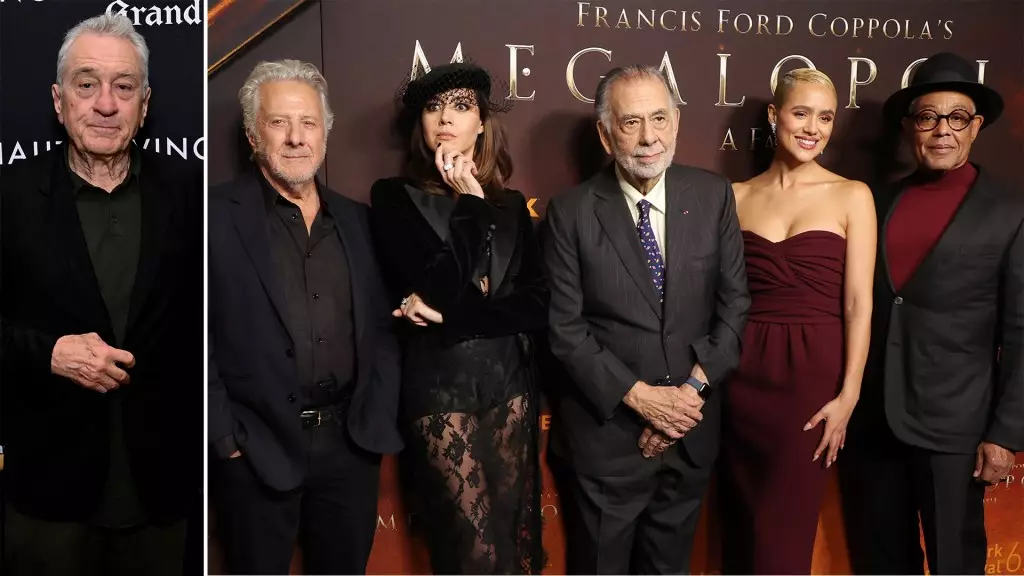Key Points
- Robert De Niro humorously critiques Donald Trump’s leadership style during the Megalopolis premiere.
- Megalopolis explores themes of civilization, chaos, and order, paralleling today’s political climate.
- De Niro, Francis Ford Coppola, and Spike Lee discuss the power of cinema to provoke political thought and activism.
- Spike Lee emphasizes the importance of voter registration and civic participation.
- Coppola advocates for collaboration across political divides in filmmaking, promoting unity through dialogue.
- The event became a reflection on how cinema and leadership can intersect to drive societal change.

Robert De Niro on Leadership, Cinema, and Politics: A Powerful Narrative at Megalopolis Premiere
At the recent premiere of Francis Ford Coppola’s much-anticipated film Megalopolis in New York City, Robert De Niro offered more than just a few laughs. His sharp and humorous remarks about Donald Trump’s hypothetical role as a film director revealed a profound critique of political leadership. As De Niro mused on Trump directing the complex project, the actor’s humor was underscored by an evident frustration with the former president’s leadership style—one that he sees as lacking coherence and vision.
For many, De Niro’s words echoed a shared sentiment about Trump’s divisive approach to governance. His suggestion that Trump would struggle to unite a creative team for a film like Megalopolis mirrored concerns about Trump’s ability to lead a country. De Niro’s comments encapsulated a broader cultural unease, resonating with those who yearn for structured leadership in both cinema and politics.
A Film With Timely Themes
Megalopolis, a film Coppola has worked on for over two decades, explores the complexities of civilization, order, and chaos—an apt reflection of current political and social tensions. The film’s premiere became a platform for examining not only art but also the parallels between its narrative and the state of the world today.
During a post-premiere Q&A, De Niro connected the movie’s themes to the current political landscape. He criticized the rise of figures he described as “not real Republicans,” urging the audience to consider their role in the upcoming elections. His remarks reflected a desire to move beyond art as mere entertainment, elevating it as a tool for activism and a means of inciting change.
Camaraderie in Cinema: De Niro, Coppola, and Lee Reflect
The event was also marked by the camaraderie between De Niro, Coppola, and fellow director Spike Lee, all veterans of the film industry. The three shared memories of their long cinematic journeys, reminiscing about their collaborations over the decades. This shared history highlighted the strong sense of community within the film world, underscoring the mutual respect they have for each other’s work.
Their dialogue also reinforced the belief that cinema, beyond being a storytelling medium, has the power to influence political and social change. Lee’s remarks during the event emphasized the need for political engagement, particularly voter registration. As a prominent voice in the film community, Lee urged his audience to recognize the link between creativity and civic responsibility.
Artistic Collaboration Beyond Political Beliefs
Coppola, known for his inclusive casting choices and willingness to collaborate with actors of varying political beliefs, added another layer to the evening’s discussion. He highlighted the importance of fostering creativity across political divides, suggesting that differing viewpoints should not hinder artistic collaboration. Instead, Coppola encouraged open dialogue, both in cinema and society, as a means of promoting unity.
His comments underscored the potential for the filmmaking process to serve as a model for societal cooperation. In an increasingly polarized political climate, Coppola’s approach to collaboration offered a hopeful vision of how differing perspectives can coexist and thrive within creative spaces.
Cinema as a Call to Action
The premiere of Megalopolis ultimately transformed into more than a celebration of Coppola’s cinematic achievement. It became a space for thoughtful reflection on the role of leadership, both in film and in society. Through humor and candid conversation, De Niro, Coppola, and Lee demonstrated how cinema can extend beyond the screen to provoke meaningful discussions about pressing societal issues.
De Niro’s critique of Trump’s leadership, coupled with Lee’s call to action, highlighted the urgency of civic engagement. The message was clear: just as filmmakers carefully craft narratives on screen, citizens must actively shape the unfolding political stories in their own lives. Through art, activism, and collaboration, the evening’s speakers reminded their audience that leadership demands coherence, vision, and, most importantly, action.